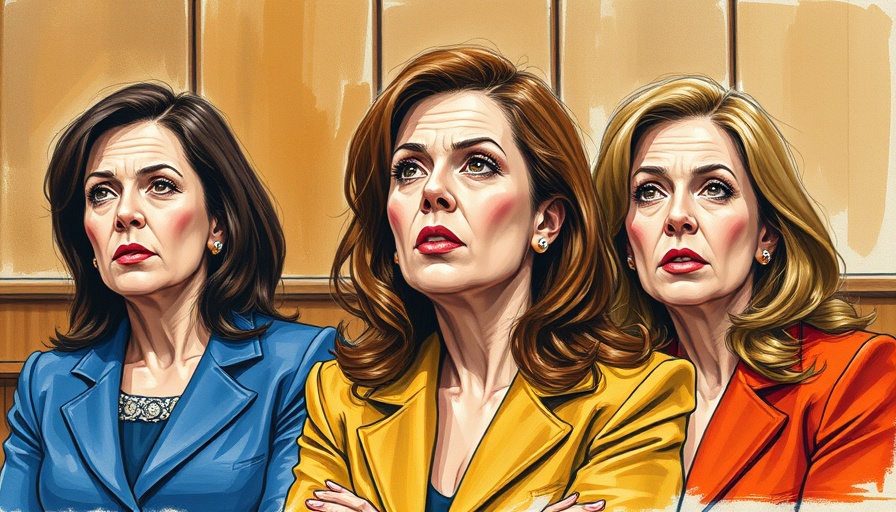
Unraveling the Accusations: Diddy's Trial and Its Significance
Sean "Diddy" Combs stands at the center of high-profile allegations in a federal sex-trafficking and racketeering trial that could define not just his future but also the landscape for victims seeking justice in similar cases. The testimonies of seven women, who have accused the music mogul of various forms of sexual and physical violence, are shaping the narrative of the courtroom and reigniting discussions around power dynamics in the entertainment industry.
Understanding the Victims: Who Are They?
The seven women taking the stand range from Combs' ex-girlfriends to former employees, each bringing unique perspectives and experiences to the trial. Among them is Cassie Ventura, an R&B artist who detailed her decade-long relationship with Combs marked by violence and exploitation. Ventura's testimony describes a chilling cycle of coercion involving drugs, sexual acts, and humiliation during what she calls "freak offs." Her narrative is not just her own; it serves as a critical lens through which the jury can understand patterns of abuse that may align with broader societal issues of victimization and manipulation.
The Role of Eyewitnesses: Credibility at Stake
One of the most striking elements of Ventura's account is the corroboration provided by eyewitnesses, including exotic dancers and other industry insiders. Some testified to witnessing Combs striking Ventura during these alleged "performances," while others spoke about the atmosphere of fear and compliance that surrounded his influence. As these testimonies unfold, they challenge the defense's attempts to label the accusers as bitter or opportunistic, raising questions about the validity of accusations and the systemic barriers faced by victims.
Legal Implications and Broader Context
The stakes of this trial extend beyond Combs as a person; they resonate within the broader discourse on sexual exploitation and the handling of such crimes in the judicial system. Prosecutors aim to establish that Ventura was not only coerced into participating in these acts but also manipulated by means of fraud—lost in the intricate web of fame, power, and intimidation. This evolution in the narrative raises essential questions: How do we define victimhood in today's world? What legal protections must be allocated to those speaking out against systemic abuse?
Future Predictions: A Shift in Cultural Mindset?
As the trial progresses, the outcomes could precipitate significant cultural shifts, especially regarding the adjudication of sexual violence in the entertainment industry. The potential for Combs to face severe legal consequences may empower other victims to come forward—a crucial step in a time when societal patience for such behavior is rapidly dwindling. Additionally, the visibility this case has gained might inspire legislative changes aimed at better protecting the rights of individuals speaking against influential figures.
Counterarguments: Unpacking the Defense's Claims
The defense arguments emphasize the accusers' motivations, positing that their testimonies stem from a desire for financial gain or revenge. This notion raises critical discussions about the responsibility of individuals in power and the complexities surrounding personal relationships when fame is interwoven. As the trial exposes the fragile line drawn between love, manipulation, and exploitation, it becomes ever clearer that much work is needed to change the perceptions and realities of those accusing powerful figures.
Witness Impact: The Importance of Narratives
Ultimately, the testimonies unraveling in court signify more than a legal battle; they are narratives of survival and resilience from those who often remain voiceless. The stories shared resonate deeply with many, allowing for an emotional connection that might galvanize further societal support for victims everywhere. Their courage in testifying opens doors for critical dialogue, empowering those who may have felt silenced.
Call to Action: Advocating for Change
As we observe this landmark trial, it’s imperative to consider the voices of all who have endured similar injustices. Engage in discussions around victim support systems and hold influential figures accountable. This trial is not merely about one man’s guilt or innocence; it prods at the very heart of how society views and supports the individual journeys of countless victims. Advocate for awareness, education, and legislative change that provides safety and justice for survivors.
 Add Row
Add Row  Add
Add 




 Add Row
Add Row  Add
Add 

Write A Comment